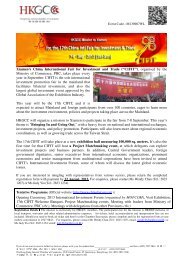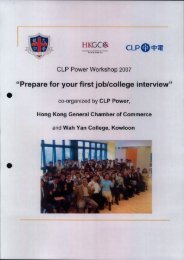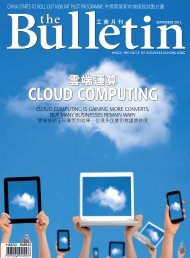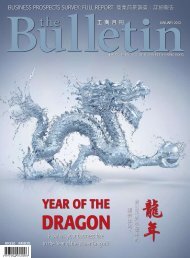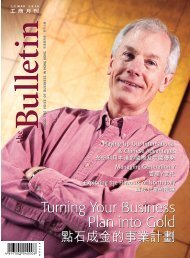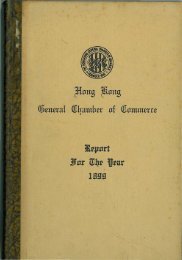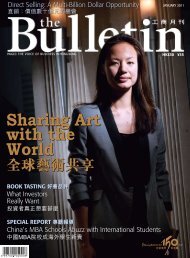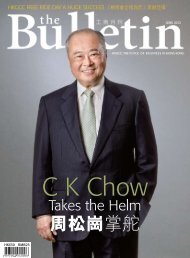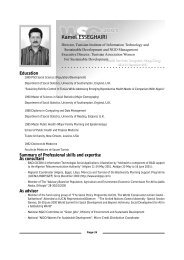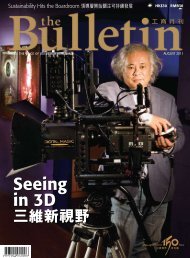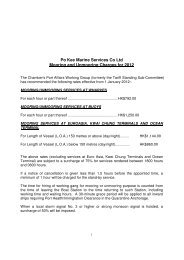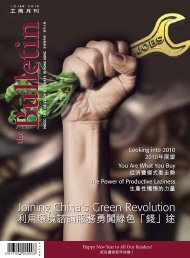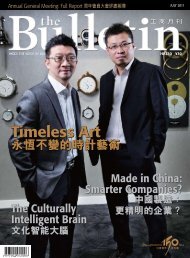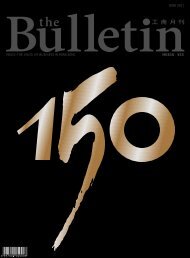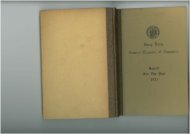2010å¹´7æ - The Hong Kong General Chamber of Commerce
2010å¹´7æ - The Hong Kong General Chamber of Commerce
2010å¹´7æ - The Hong Kong General Chamber of Commerce
You also want an ePaper? Increase the reach of your titles
YUMPU automatically turns print PDFs into web optimized ePapers that Google loves.
| China in Focus 中 國 焦 點 |<br />
RMB Trade Settlement Makes<br />
亞 洲 區 人 民 幣 貿 易 結 算 前 景 看 好<br />
By Subir Mehra 繆 信 平<br />
<strong>The</strong> Asian economy has picked up<br />
speed this year. Intra-regional<br />
trade is growing strongly, with<br />
Mainland China firmly at the centre.<br />
Earlier this year, the Mainland entered<br />
into a free trade agreement with six<br />
ASEAN countries, creating the world’s<br />
largest free trade area, covering almost<br />
1.9 billion people and a trade relationship<br />
worth US$213 billion last year.<br />
It is not surprising that any developments<br />
regarding the renminbi<br />
(RMB) makes headlines around the<br />
world: how China does business with<br />
its trading partners has an increasing<br />
impact on the world economy and on<br />
individual businesses.<br />
<strong>The</strong> launch <strong>of</strong> the pilot RMB trade<br />
settlement scheme last year by the<br />
Mainland financial authorities was a<br />
very positive development. <strong>The</strong> scheme<br />
allows RMB to be used by designated<br />
enterprises in certain regions in Mainland<br />
China, including Shanghai and<br />
some cities in Guangdong Province,<br />
and their trading partners in <strong>Hong</strong><br />
<strong>Kong</strong>, Macau and member countries<br />
<strong>of</strong> the ASEAN. <strong>The</strong> number <strong>of</strong> Mainland<br />
businesses eligible to participate<br />
has been increasing in recent months.<br />
Recently, there has been further<br />
relaxation on restrictions on RMB<br />
business in <strong>Hong</strong> <strong>Kong</strong>. Since February<br />
this year, it has also been possible for<br />
companies in <strong>Hong</strong> <strong>Kong</strong> to make and<br />
receive payments in RMB with third<br />
parties for trade purposes. This means<br />
companies can transact with businesses<br />
in markets other than Mainland China<br />
in RMB to reduce the foreign currency<br />
exchange risk. Before, a <strong>Hong</strong> <strong>Kong</strong> company<br />
would have to convert U.S. dollars<br />
collected from their foreign buyers into<br />
RMB to pay their Mainland suppliers,<br />
incurring extra transaction costs and<br />
foreign exchange risk. Now, a company<br />
can transact in RMB with their foreign<br />
buyers and reduce exposure to foreign<br />
exchange volatility.<br />
Also, RMB lending in <strong>Hong</strong> <strong>Kong</strong> is<br />
no longer restricted to trade finance but<br />
extended to other types <strong>of</strong> lending, such<br />
as term loans, project finance and RMB<br />
credit cards. That is good news for service<br />
trade companies – transactions are<br />
not restricted to mercantile trade but is<br />
also extended to services.<br />
<strong>The</strong>se measures are widely interpreted<br />
as the first steps towards eventual RMB<br />
internationalisation, but even in the<br />
short-term, settling trades in RMB can<br />
provide a number <strong>of</strong> benefits to businesses<br />
on both sides <strong>of</strong> the transaction:<br />
Tax rebates – Payments for Mainland<br />
exports settled in RMB are eligible for<br />
export tax rebates equivalent to about 6%<br />
<strong>of</strong> a company’s total exports. Unlike trades<br />
in foreign currencies, RMB-denominated<br />
trade transactions are exempt from verification<br />
by the State Administration <strong>of</strong> Foreign<br />
Exchange (SAFE) when Mainland<br />
companies apply for export tax rebates.<br />
This will simplify and shorten the rebate<br />
process, significantly strengthening companies’<br />
short-term liquidity.<br />
Reduced transaction costs – A major<br />
Thailand-based supplier <strong>of</strong> medical<br />
equipment says it saved between 5-7%<br />
in transaction costs by switching<br />
from U.S. dollars to RMB to pay its<br />
Mainland supplier. Further, given the<br />
present low interest rates for borrowing<br />
in HKD and USD, it may not be<br />
as attractive for customers to borrow<br />
in RMB. But, in the longer run, when<br />
interest rates normalise, we expect<br />
more businesses to borrow RMB for<br />
trade settlement to save on foreign<br />
exchange costs.<br />
Capital preservation – For now, RMB<br />
trade settlement is one <strong>of</strong> the few ways<br />
for corporates to accumulate RMB<br />
outside China. In light <strong>of</strong> the current<br />
weakness <strong>of</strong> the U.S. dollar – to which<br />
the <strong>Hong</strong> <strong>Kong</strong> dollar is pegged – corporates<br />
receiving RMB can hold the<br />
currency if they anticipate currency<br />
appreciation. At the same time, eligible<br />
enterprises on the Mainland are<br />
allowed to keep their renminbi revenue<br />
overseas. This gives them more<br />
flexibility to manage capital flows.<br />
Alternative investment tools – Under<br />
the RMB trade settlement pilot<br />
scheme, companies can use their<br />
RMB trade income to purchase RMB<br />
bonds issued in <strong>Hong</strong> <strong>Kong</strong>.<br />
Amidst the current low<br />
interest rate environment,<br />
RMB bonds provide businesses<br />
with an option to diversify<br />
their investments and tap<br />
into the growth<br />
in the Mainland.<br />
Subir Mehra is Chief Operating Officer for HSBC Commercial Banking Asia-Pacific.<br />
繆 信 平 是 滙 豐 工 商 業 務 亞 太 區 常 務 總 裁 。<br />
20 July 2010 <strong>The</strong> Bulletin 工 商 月 刊



